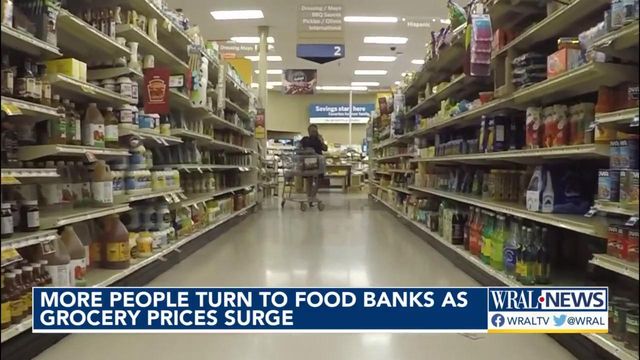With inflation stretching budgets thin, food banks reporting increase in families needing help
With the cost of everything on the rise, including groceries, many North Carolinians are turning to food banks to feed their families.
"Buying $50 worth of groceries is now $75, $80. It's really not that nice," said Ryan Spear, who lives in Raleigh.
Organizers with one central North Carolina group said their partner agencies have seen a 42% increase over pre-pandemic levels of people stopping in to get food.
"The need has already been spiking the last couple of months," said Jennifer Caslin, a spokeswoman for The Food Bank of Central and Eastern North Carolina.
Henry McKoy, an economist at North Carolina Central University, said it’s not a bad idea for families to seek out help — given the state of the economy.
"Take advantage of those support systems like the food banks, like the churches, things of that nature. Wherever you can cut ... cut," he said.
Caslin said the increased demand is no surprise as some North Carolinians struggle to make ends meet.
"Because of the rising costs of things – the rising costs of gas and food – the budgets just aren't stretching as far as they used to," said Caslin.
The Food Bank of Central and Eastern North Carolina says they're distributing more than two million pounds of food a week.
The organization serves 34 counties in North Carolina. Organizers said they aim to help one in seven adults, or roughly 580,000 people who experience food insecurity in the area and the 321,000 children who rely on free or reduced school meals.
"Families have already had had extra stress on them," said Caslin. "It's just not a great time to have that extra stress."
Donations at the food bank generally slow down around the summer, which, along with growing demand for food, is making it hard for food banks to stay fully stocked.
"Summer is a time where we really see a spike because of these kids being out of school and not being able to access meals," said Caslin.
"It's also a time when a lot of people don't think about donating to food banks," she said.
To help, the food bank is kicking off "Stop Summer Hunger" which has a goal to feed 10 million meals.
"Food is a basic need for everybody, and especially in the summer, I think kids really hit home with people. It's very hard to think about kids going hungry," said Caslin. "Unfortunately, the way things have been the last couple of years, there are just far too many kids who are dealing with that."
The initiative starts Wednesday and runs through July 31.
"After the 90 days of summer that these kids have, they will be back in school and have access to the school meal meals ... we hope that the help some of these folks received over summer will help sort of buoy them, said Caslin.













